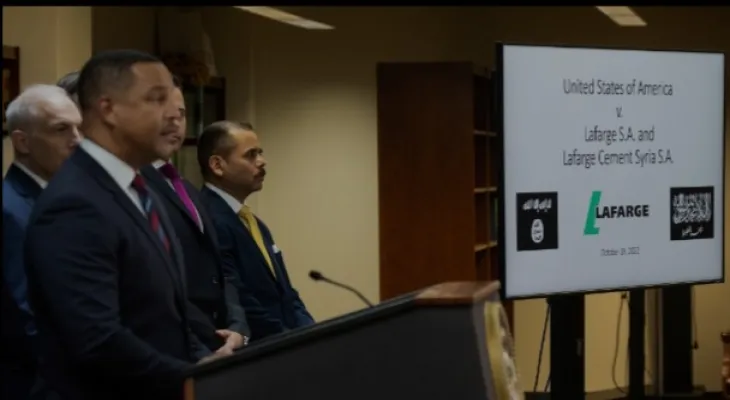Search here
Newspaper
Search here

Arab Canada News
News

Published: October 19, 2022
French cement company Lafarge admitted on Tuesday that it was guilty of paying millions of dollars to the Islamic State to keep a plant operating in Syria, where the extremist group was involved in torturing Western hostages, and agreed to pay nearly $778 million. The Department of Justice described the situation as the first case of its kind, accusing the company of overlooking the Islamic State’s behavior after the group seized new areas in war-torn Syria. Also, the company’s actions, previously investigated by French authorities, occurred before its merger with Swiss company Holcim to form the world’s largest cement maker, with Justice Department officials describing it as the first case where a company pleaded guilty to conspiring to provide material support to a foreign terrorist organization. Lafarge and its long-time Syrian subsidiary also entered the plea, agreeing to criminal fines of $90.78 million and forfeiture of $687 million. In this regard, Matthew Olsen, the top national security official at the Justice Department, said: "There is no justification that permits a multinational company to make payments to a designated terrorist group; such payments are blatant violations of our laws, warrant the highest level of scrutiny by U.S. authorities, and call for severe punishment.” Prosecutors also say the company directed nearly $6 million to ISIS and Jabhat al-Nusra, another extremist group, in 2013 and 2014. The Department of Justice said the payments were not due to any ideological alliance but for a simple economic advantage. Additionally, the company had established a $680 million plant in northern Syria in 2011, and facing competition from cheaper imported cement, considered payments to ISIS a means to ensure the plant’s continued operations, protect its employees, and transport raw materials. The Justice Department accused the company of using forged contracts and fake invoices to conceal the partnerships. The payments came at a time when other companies were withdrawing operations from the area and when videos of beheadings posted by ISIS had revealed to the world the brutal actions committed by the Islamic State. For example, shipping documents cite an email exchange on August 20, 2014, where company officials describe their negotiations with ISIS, with one discussing the need for a company lawyer to review "the consequences of this kind of deal." A day earlier, ISIS posted a gruesome video showing the killing of American journalist James Foley. The allegations relate to conduct previously investigated by authorities in France, where Lafarge had earlier admitted to transferring funds to Syrian armed groups in 2013 and 2014 to ensure safe passage for employees and supply its plant. In 2014, the company faced preliminary charges including financing a terrorist enterprise and complicity in crimes against humanity. Later, the Supreme Court in France overturned this ruling, prompting another French court earlier this year to declare that Lafarge should face charges of complicity in crimes against humanity.
Comments